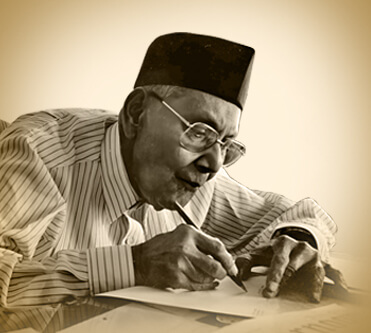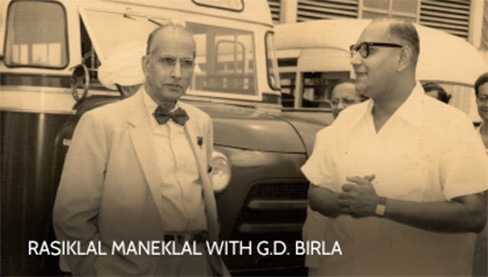RM Capital Family Office
Rasiklal Maneklal Capital (RMC)
A LEGACY OF TRUST, INSIGHT, AND PURPOSE
UNIDEL traces its roots to the early 1900s with Rasiklal Maneklal & Company, a pioneering stockbroking and investment firm of its time. That foundation has since evolved into Rasiklal Maneklal Capital (RMC), the Single Family Office for the UNIDEL founders. Today, RMC continues this heritage by delivering investment management, asset allocation, and a full suite of middle- and back-office services.
RMC embodies Rasiklal Maneklal’s enduring legacy – anchored in integrity, sound financial planning, and judicious investing – focused on safeguarding prosperity for future generations. Its purpose is to serve family members with a commitment to their long-term well-being and advancement.
Our guiding values, in order of importance, define everything we do:
- Trust – The bedrock of our relationships, earned through steadfast ethics and transparency.
- Risk – The careful identification and management of both known and hidden risks in our investment strategy and operations.
- Return – Pursued with discipline and foresight, aligned to long-term security.
- Insight – Cultivated through thoughtful analysis, informed decision-making, and legacy stewardship.
About Rasiklal Maneklal

The Legacy of a Man Who Never Quit
Rasiklal Maneklal was born in 1914 to Maneklal Jethabhai and Subhadra Ben. Brought up and educated in Ahmedabad, he received his BA in Economics from Gujarat College. Having lost his father at an early age and as the only son and breadwinner, young Rasiklal moved to Bombay in search of work. RM joined the fledgling Bombay Stock Exchange that had just recently occupied its new building on Dalal Street and founded Rasiklal Maneklal & Co. Alongside building a successful broking business, RM invested in what he thought were “blue chip” companies, for the long term. His investments in corporate India were wise and have stood the test of time even after four generations.
RM was well known for his astute business sense and his impeccable integrity and served on the Governing Board of the Bombay Stock Exchange for several decades. He was invited to be a Board Director of several large corporate houses; Century Mills, Birla Jute, Grasim, Arvind Mills, and Futura Polymers, and served on these boards with a sense of responsibility.
In the 1990s, after his retirement, and long after his firm had stopped actively trading on the exchange, RM continued to enjoy attending his office, giving counsel to fellow BSE members and arbitrating corporate disputes.
Our Legacy
RM’s ethics of hard work and fair play continued at home where he made sure that his three children learnt the value of money and were educated to the best of their own abilities and desires. As the family expanded, RM took a keen interest in his grandchildren’s as well as his great-grandchildren’s education and financial security.
Whether it was at work or home, he built an atmosphere of trust and led by example. RM was a meticulous man who did not believe in shortcuts. He had faith in the power of hard work. His most important legacy to his inheritors is a strong set of ethics and a robust value system.

The Maneklal Jethabhai Public Library

In 1930, Mahatma Gandhi launched his protest against the British tax on salt by undertaking his famous Dandi march. As he left his Sabarmati Ashram to begin the march, Gandhi vowed he would not return to live in Ahmedabad until India achieved independence. The British retaliation to the salt tax defiance and his own vow meant Gandhi would not be able to return to the city anytime soon. Concerned about the prized collection of thousands of books left behind at his ashram, Gandhi offered his collection to the city of Ahmedabad with the hope of forming a public library. It was Rasiklal Maneklal who stepped forward to build this public library in memory of his late father Sheth Maneklal Jethabhai.
Gandhi himself came to lay the foundation stone on 21 September 1933, and on 18 April 1938, Sardar Vallabhbhai Patel, his fellow freedom fighter, conducted the opening ceremony.
RM’s mother Subhadraben Maneklal, made an additional donation to construct an expanded reading room, which still serves as a focal area of the library. The city of Ahmedabad assumed responsibility for the library and named it the Sheth Maneklal Jethabhai Library.

The collection now has over eight hundred thousand volumes and eight hundred current serial subscriptions, making it one of the largest public libraries in India. Current serials and English and Gujarati books, as might be expected, are the most intensively used portions of the library. However, given the diverse population of Ahmedabad, the M. J. Library offers books in most of the Indian languages. It has also introduced innovative library programs, and the construction of an auditorium has allowed it to sponsor many public lectures and events. The orientation toward literacy and children sparked the development not only of a children’s room but also a special children’s museum and a toy section.
Nirmala Rasiklal Charity Trust
Rasiklal Maneklal set up the Nirmala Rasiklal Charity Trust to continue his philanthropic activities from Bombay. The trust, managed by family members, continues to be a beacon of hope, focusing its efforts on the literal backbone of human life – the spine. By funding research into spine-related scientific research and biomechanical engineering innovations, the trust is committed to preventing spinal ailments. Additionally, the trust also supports patients in need of spinal care and surgeries, demonstrating a steadfast dedication to improving lives.